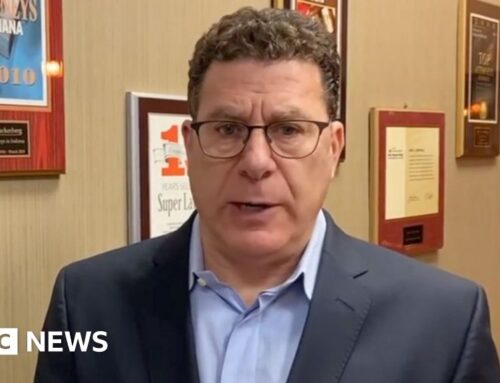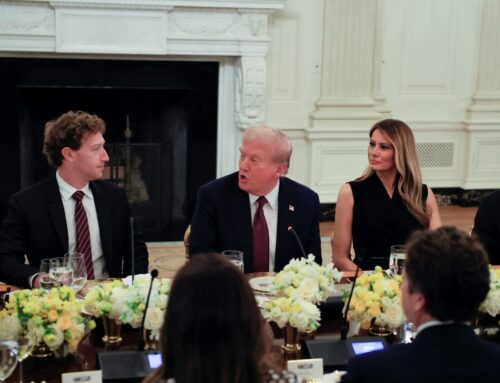Cannabis regulator: New high for Minnesota sales coming soon
July 23, 2025
Amid the coffeeshops and cocktail lounges that dot the intersection of West 25th Street and South Lyndale Avenue in Minneapolis sits the Loon Smoke Shop, where amiable loiterers congregate late into the evening vaping or smoking.
You might soon find a scene like this a few blocks south at the smoke shop’s new dispensary, which is in the final steps of the state cannabis licensing process and is hiring people “passionate” about the marijuana industry.
“We’re currently looking for budtenders, lead budtenders and store managers,” an Instagram post read.
When Gov. Tim Walz signed legislation legalizing cannabis in 2023, there was a retail target that stores across the state would open by 2025 at the latest.
As MinnPost has diligently chronicled, that hasn’t happened. Asked last week which of the DFL-controlled Legislature’s myriad laws passed in 2023 is most difficult to implement, Gov. Tim Walz was quick to say legal weed.
That might be changing.
In the last month, the Minnesota Office of Cannabis Management has granted final approval to five retailers to begin selling cannabis, the first such businesses not operated by one of the state’s 11 tribal nations.
By the end of the year Minnesota could see up to 150 marijuana businesses not owned by the tribes, according to Eric Taubel, interim director of the Office of Cannabis Management.
Taubel said in an interview that if a cannabis shop is slow to get off the ground, the weed entrepreneur can no longer blame a cumbersome state licensing process.
“We’ve transitioned to the point where the onus is on the applicant and a prospective business owner,” Taubel said.
Here is an assessment of where Minnesota is in legalizing it.
I want legal marijuana now. Where can I buy it in Minnesota?
Except for drinks at bars and liquor stores infused with hemp-derived THC, the sale of marijuana is still confined to tribal operators.
Returning to Minnesota marijuana legalization 101, the state law permits tribes to determine how they want to oversee grow and sales operations.
“Minnesota is a national leader in its approach to cannabis and tribal nations,” Taubel said. “Gov. Walz and Lt. Gov. Flanagan have been leaders in what tribes can do and recognize their inherent sovereignty.”
As a result, Minnesotans can stop reading this article and drive right now to retailers on tribal lands. Stores have been open since August 2023 when the Red Lake Nation opened a dispensary.
The law also lets these tribes operate pot businesses outside reservation land if they agree to an overall regulatory compact with the Office of Cannabis Management. The first such compact was finalized in May with the White Earth Nation, which has since opened stores in St. Cloud and Moorhead.

“I don’t think any other state has a model like this,” said Leila Fatehi, a lawyer at Blunt Strategies, an aptly named Minneapolis-based law firm representing pot businesses. “I don’t think it was anticipated that the tribal program and operations would start so far ahead of non-tribal licenses.”
What about the five non-tribal licenses you mentioned?
The Office of Cannabis Management granted final approval in June for a company called Herb-Quest to operate a cultivation center in Pine County.
Then this week, Concentrate Labs, doing business as Roots and Resin Farm, got the state’s greenlight to open its own cultivation site in Chisago County.
And The Smoking Tree, Loon Lab Extracts and Research (not to be confused with Loon Dispensary), and Fairwater Farm nabbed licenses to sell pot in the cities of Albert Lea, Isanti and Plainview respectively.
Related: Cannabis retailers navigate nuanced regulatory landscape ahead of their business debuts
These five businesses not only cleared state hurdles but also went through the county and city approval process, more or less.
Jacob Schlichter, founder of the Smoking Tree, told MinnPost that he must still get final permission at a July 28 Albert Lea City Council meeting. But Schlichter described this step as a formality. He fully expects to open his shop in the coming weeks.
What is this I’m seeing about cannabis state lotteries?
In June, 249 applicants won a lottery held by the Office of Cannabis Management, including the aforementioned Lyndale Avenue Loon dispensary.
Each winner qualified for social equity status, whose criteria can include veteran status, being a victim of the war on drugs, or coming from a high-poverty area.
Related from MinnPost’s archives: How Minnesota’s social equity cannabis rules are playing out
On Tuesday, the office held a second lottery with 75 winners out of 569 applicants, a pool that included applicants who did not qualify for equity status.
But winning these lotteries is just one step in the path toward a state license. Though city and county governments are not legally permitted to reject a pot business, they can put forth requirements, such as a store being a certain distance away from a school.
“Each municipality handles zoning differently,” Taubel acknowledged. “The county and city may only meet every month.”
The Cannabis Management interim director described a “checker board” of additional steps, including submitting to a criminal background check (While the state wants to help victims of stern drug possession laws, they do not want to assist convicted white-collar criminals) and a labor agreement that affords employees rights in exchange for no pickets, boycotts or strikes at the cannabis business.
Once lottery winners jump through these hoops, they can apply with the state for final approval.
So why weren’t recreational cannabis stores opened by 2025 at the latest?
Walz attributed delays in part to shifting leadership at the Office of Cannabis Management. In January, one interim director, Charlene Briner, was replaced by another interim head, Taubel. And before Briner, there was a botched hire in 2023 that led to a review by the Office of the Legislative Auditor.
(Walz said of Taubel, “I think he’s done a fantastic job.” But the governor declined to say whether he will be named permanent director.)
The governor also said, “There really was not a model of how to do it,” adding that each of the 22 states preceding Minnesota in legalizing pot “have struggled to a certain degree.”
The model the state chose is also an unusual one.
“In Minnesota, the rollout has been a bit slower than in other states, which relied on incumbent medical marijuana dispensaries,” Fatehi said. “Minnesota created a framework to have a larger pool of applicants.”
That choice is now bearing fruit, Taubel said, as dozens of legal pot stores, many founded by entrepreneurs new to the industry, should come online by the end of the year.
One concern of some non-tribal businesses is that the tribes got too much of a headstart. Fatehi was skeptical of this line of thinking. But she did say early Minnesota retailers are likely to buy from tribal cultivators.
Another worry is that legal weed becomes too expensive. A state budget otherwise conspicuous in its absence of new revenue raised the cannabis tax from 10% to 15%.
Including state and local sales tax, customers will pay north of a 20% levy on each cannabis purchase.
“There is absolutely an enormous cause of concern that it is taxed too high,” Fatehi said.
Taubel defended the tax as “middle of the road” compared to other states. (It is a very long metaphorical road. Per the Tax Foundation, Connecticut has the lowest weed excise tax at 3%. Washington state sports the highest at 37%.)
“I’m a little suspect that the 5% increase will have substantial ripple effects,” Taubel said.
MinnPost reporter Brian Arola contributed to this story.
Search
RECENT PRESS RELEASES
Related Post



